Knock, Knock.
Who’s there?
Just.
Just who?
Just your mischievous fridge, trying out a new, nerve-racking sound in the kitchen!
Well:
We all love a good knock-knock joke. But when your refrigerator makes knocking noises, it’s no laughing matter.
Don’t worry, though – that is why you are here.
In this article, I will dive into all the possible reasons why your fridge is making knocking noise. Plus, how to identify the problem’s source and what experts recommend to fix it.
That said:
To help you solve this mystery, I have enlisted insights from one of the best refrigerator repairmen in Tampa Bay, FL – Billy Moore.
With our combined, 26-year fridge repair experience, we’ve compiled the best troubleshooting guide below.
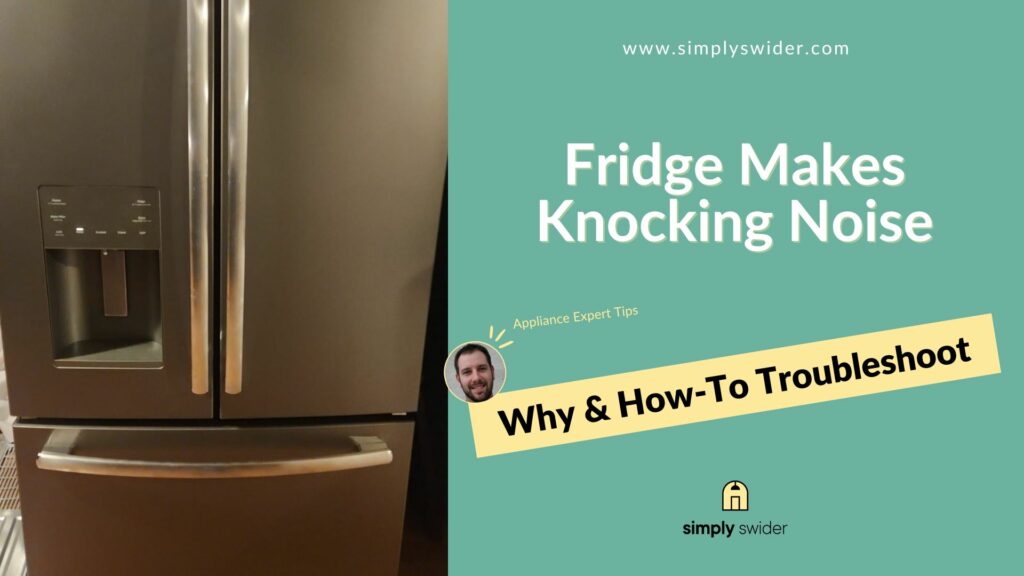
Table of Contents
Why is Your Fridge Making Knocking Noises?
In most cases, a refrigerator making knocking noise could be because of a loose or failing compressor. However, the knocking sound can also come from condenser fan blades hitting objects. Or the evaporator fan blades being bent out of shape or hitting ice lumps. The easiest solution is to listen and locate the issue. Then clean, defrost, or replace the affected part.
We can all agree:
A refrigerator is probably the noisiest appliance in any kitchen; humming, clicking, whirling, buzzing, gurgling, and whooshing 24/7.
And yes…
“These are all normal sounds“ according to LG Electronics.
However:
Billy says, “When you hear your refrigerator making knocking sounds, it could indicate something is seriously wrong.“
Do you want to learn more?
If so:
Here is everything you need to know to end refrigerator knocking noises to restore serenity in your house.
A Look at 5 Common Sources of Knocking Noises in Refrigerators
I always say this:
Start by pinpointing the area giving out the noise.
Now, assuming you know where all the parts of a typical fridge are, it should be easy to list of possible faulty components and their ideal fix.
That said:
SAFETY IS ALWAYS PARAMOUNT.
So, make sure you wear the right protective gear – safety goggles, closed rubber shoes, insulated gloves, and coveralls.
More so:
- Before working on your refrigerator, switch it off
- Use suitable, insulated tools
- Prevent the risk of electrocution by wiping off any water present in and around your workspace
- To avoid burns, wear a dry mitt (kitchen glove) if you want to feel/touch your (hot) compressor for abnormal vibrations during operation
- Pay close attention to the warning signs placed on different fridge components
- Use the correct replacement parts for your brand and model
With that in mind…
Here are a few reasons why you are hearing a knocking sound from the refrigerator.
1. Refrigerator Compressor Knocking
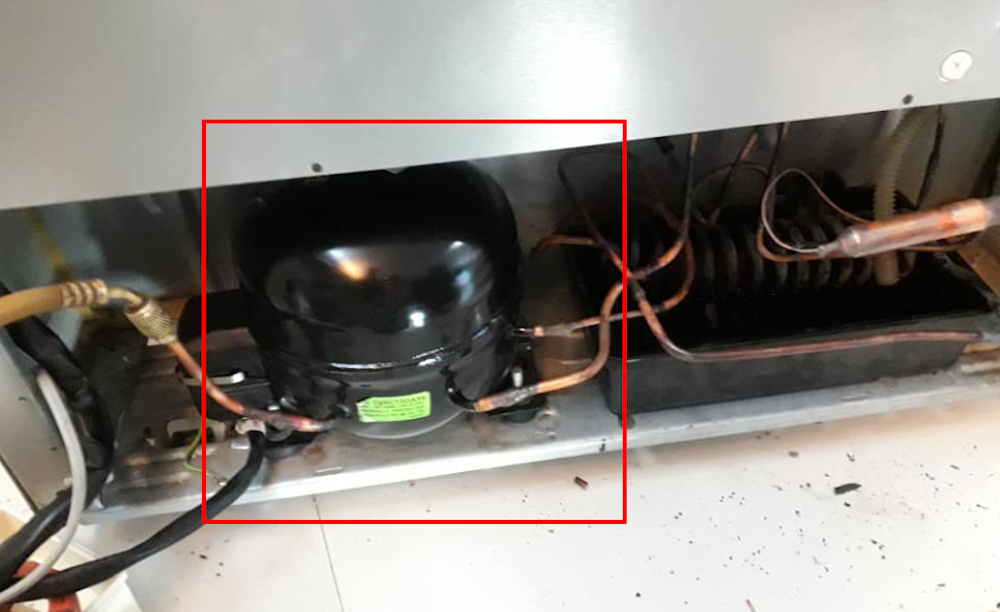
| Part | Compressor |
| Location | Bottom/Back of the Fridge |
| Ease of Troubleshooting | Semi-complex |
| Special Note | DIY Compressor repair or replacement is not recommended. Consider hiring a professional. |
| Cost | $200 – $600 |
| Repairable? | No. Replacement only. |
According to Billy…,
“A knocking noise coming from the refrigerator compressor could mean one of two things. A – the compressor is failing or B – it is loosely mounted and in need of new bushings or tightening.”
Now:
Let’s look at both scenarios.
Problem:
For a failing or damaged compressor, you will most likely face something similar to this Maytag MSD2433HEW user’s Reddit thread.
If true, your compressor has broken or worn-out internal components.
Hence, the knocking noise could be coming from loose components hitting the compressor’s housing during operation. But, it is worth noting that this is only common in old compressors/refrigerators.
So, what if the fridge is new?
Billy says, “For a new refrigerator making knocking sounds, you need to check if the compressor is loosely mounted or vibrating more than usual.“
Note:
A compressor is more like a car engine, which vibrates a lot when running.
Therefore, if it is loosely mounted or the rubber bushings are worn out, the vibrations might get worse and loud. Thus, causing it to ‘knock’ on your refrigerator’s frame.
Identification:
This is fairly easy…
Carefully pull your fridge away from the wall so that you can clearly see and hear the compressor clearly. Then check if it is making this noise (or something similar).
If you are not sure, there is a quick workaround.
Sometimes wearing a mitt and carefully (but firmly) placing your hand on the compressor’s housing might help.
“If the noise grows quieter when you place your hand, your compressor is loosely installed. If not, you might notice stronger vibrations owing to damaged internal components clunking about,” explains Billy.
Straightforward, right?
Solution:
Start by tightening your compressor’s mount nuts if they are loose.
If that does not stop the knocking noise, you should consider having it replaced. Note that this is not recommended as a DIY fix.
In fact, according to the EPA, replacement should only be carried out by a skilled, certified technician. Why? Because the whole process of replacing a fridge compressor is very complex and hazardous.
But, if you are curious, here is a breakdown of how it is done:
Side note:
If you have a Kenmore Elite refrigerator making knocking noise after movement/jarring, don’t fret. It is temporary and most likely the linear compressor reacting to the sudden jolts.
2. Frozen or Damaged Evaporator Fan Motor
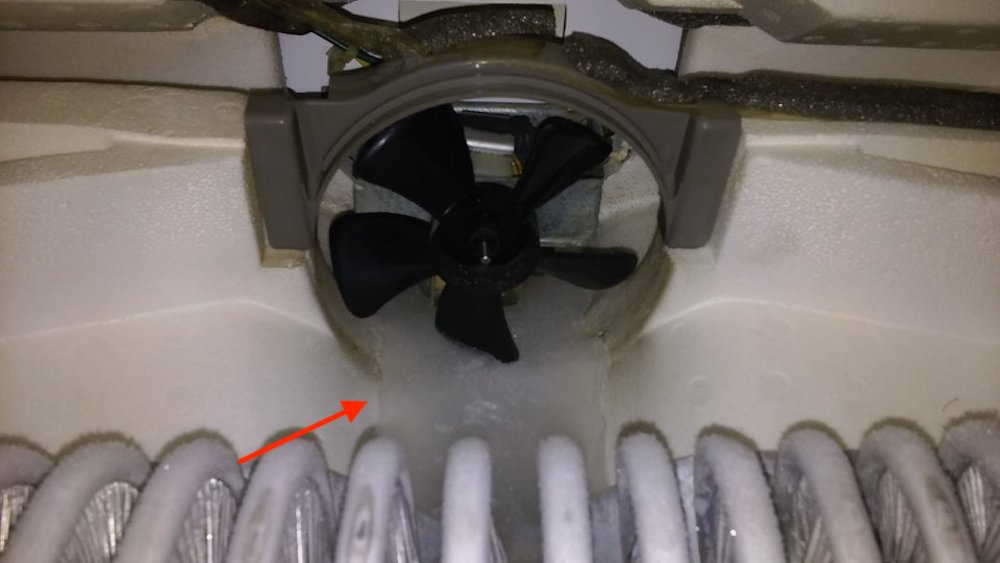
| Part | Evaporator Fan Motor |
| Location | Usually, in the freezer compartment. However, the location might differ based on design. |
| Ease of Troubleshooting | Easy |
| Special Note | This part might be the problem if the knocking noise stops when you open your fridge door and vice versa. |
| Cost | $15 – $40 |
| Repairable? | No. Defrost or Replace |
If you have a Samsung refrigerator making knocking noise, this is often the most common issue.
Get this:
The Evaporator (Evap) Fan Motor helps to circulate cold air from the freezer to other parts of your fridge.
Unfortunately, the cold air movement, leaks, or water from melting ice during defrosting can cause ice formation in and around the fan motor.
Problem:
The presence of ice in and around the evap fan can lead to two things:
a) Completely Jammed Evaporator Fan Blades
This is when Ice build-up prevents the fan’s blades from making a complete rotation. And that can lead to a refrigerator making intermittent knocking noise.
Billy says:
“For this kind of issue, the knocking frequency is often slightly spaced out – about one to two seconds apart. This is because the fan is trying to run but failing; due to an obstruction (in this case, ice).”
b) Partially Frozen Evap Fan Blades
For this scenario, the knocking frequency will be faster than the former.
Why? Because “the ice build-up is partially blocking but not stopping evap fan blade rotation,” according to Billy.
So, the noise comes from rapidly moving fan blades hitting/scrapping the ice. This can also make the fridge unbearably loud and noisy as more ice builds up.
However:
It’s important to note that, in some cases, the issue might not be ice-related.
Billy points out that “sometimes the noise could be because the fan blades are damaged or warped.” Therefore, you should look out for that too.
Identification:
How can you tell that this is it?
According to Billy, “Here, you want to look at the source of the knocks, frequency, and how the fridge behaves.“
In simple terms, you have a frozen/damaged evap fan if:
- The noise coming from your freezer or ice maker compartment (in some models)
- And the noise stops when you open the fridge door and vice versa
Solution:
Start by checking for ice build-up and defrost if any.
If that doesn’t stop the noise, inspect your evap fan blades for warping, breaks, or damage. And consider replacing it if you notice any of these defects.
3. Problems With the Condenser Fan Motor

| Part | Condenser Fan Motor |
| Location | At the bottom of the fridge next to the condenser coils |
| Ease of Troubleshooting | Easy |
| Special Note | Be careful not to damage the coils |
| Cost | Fan Motor: $25 – $130 |
| Repairable? | No. Remove any obstructions on the condenser fan blades. Replace, if damaged. |
Problem:
Much like the evap fan, obstructed or damaged condenser fan blades can also cause knocking noises.
According to Billy…
“Condenser fan blades are made of light materials to lessen the load on the motor – with the most popular options being either metallic or plastic. Unfortunately, this makes them easy to break or warp.”
“And that can lead to misalignment or loose blades knocking on other components during rotation.”
That said:
I was tending to a Whirlpool refrigerator knocking noise service call a few days ago.
The culprit – a loosely mounted condenser fan motor – was causing irregular/misaligned blade rotations, resulting in the noise.
Identification:
Since the fan is placed in an accessible area, it is easy to see if the blades are misaligned, damaged, or making irregular/wobbly rotations.
More so:
Billy says, “Another sign would be if the noise begins whenever the fan or compressor is activated – because both start almost instantaneously.”
Solution:
Here, start by inspecting the fan blades for damages, warping, or breaking. If any, replace it.
More so:
Remove any obstructions or foreign objects that may be hindering blade rotation. And then, try to fasten or secure the nuts/screws that hold the condenser fan motor in place.
4. Ice Maker Problems
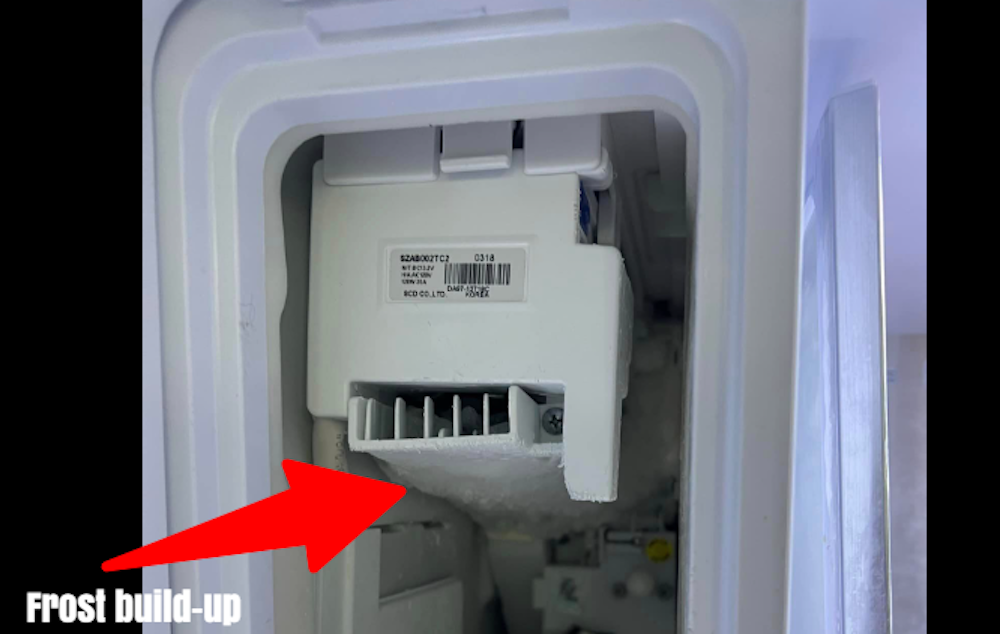
| Part | Ice Maker Assembly |
| Location | Usually inside the top compartment |
| Ease of Troubleshooting | Easy |
| Special Note | While defrosting is ideal in this situation, it is important to inspect your ice maker assembly for damaged components; to avoid a repeat. |
| Cost | $50 – $150 |
| Repairable? | Clean, Defrost, or Replace if damaged. |
Problem:
If you’ve ever heard a Samsung refrigerator ice maker knocking noise, then you know how loud and annoying it can get at times.
A good example?
Well, this is something many know too well; including this Samsung RF263AEBP French Door user. However, in their case, a replacement of the entire assembly solved the issue.
That said:
Owing to their primary function, ice makers tend to freeze up every once in a while.
And “since these assemblies have moving parts, irregular ice formation around them can cause knocking sounds when the ejector arms/blades get stuck.“ according to Billy.
Identification:
Well, is your fridge still cooling despite the noise? Is the noise coming from the ice maker section of your freezer? Have you noticed any frost build-up around it?
If your answer is Yes to any of the questions above, check your ice maker.
Solution:
Well, according to this Frigidaire Gallery French Door (FGHB2868TD) user, emptying the ice tray solved the issue.
Easy, right?
Well, that is not always the case.
This is why I always recommend defrosting the ice maker in case of frost build-up. Then, remove and inspect the assembly for damages or broken components.
Once, all that is done, reinstall your ice maker and run it to see if it runs smoothly and as intended.
Unfortunately:
If the noise is persistent or you notice damaged components within the assembly, a complete replacement might be necessary.
5. Damaged Damper Control Assembly

| Part | Refrigerator Damper |
| Location | Upper section of the refrigerator compartment |
| Ease of Troubleshooting | Easy |
| Special Note | Damper design differs from one refrigerator to the other. For newer fridge models, improved designs make damper knocking noises quite rare. If you experience this, I recommend first checking the evaporator fan for issues. |
| Cost | $60 – $170 |
| Repairable? | No. Clean, Defrost, or Replace if faulty. |
Problem:
According to Billy…
“Damper knocking noises are rare, especially, in newer fridge models. However, you shouldn’t rule it out if your appliance keeps making a racket; especially after trying all other remedies.”
Here is a close example of a GE refrigerator damper making knocking/clicking noises.
Hmmh…?
Anyway, from the cases I’ve handled, the issue is often caused by ice build-up or worn-out gears within the damper assembly.
Identification:
Damper malfunctions can cause several issues including…
- Excessive or irregular cycling
- Inconsistent refrigerator temperature control
- Unusual and loud vibrations around the damper assembly
- Noise – either knocking or clicking
If you notice all the above, then your Damper is probably faulty.
Solution:
Unfortunately, most people tend to confuse ice build-up around the evaporator fan for a faulty damper; since both are often located in the same area.
So, you need to be thorough when inspecting this assembly for flaws.
That said…
If you are certain that the noise is coming from your damper(s), consider doing a replacement. Here’s an example of how it is done:
6. Normal/Regular Knocking Noises
Now:
It goes without saying that not all knocking noises are bad. So, you shouldn’t panic every time you hear these noises.
Here are some types of knocking sounds that do not warrant much attention:
- The Water Hammer Effect: This is often a result of changes in water pressure as the inlet valve solenoid suddenly opens and closes. To fix this, you should install a water hammer arrestor or pressure regulator within the fridge’s water supply line.
- Refrigerant Piping and Expansion: Popping and knocking sounds are normal as refrigerant travels through the piping owing to changes in temperatures. More so, these changes can also cause the appliance’s plastic parts to expand and contract, hence, the knocking noise.
- Uneven Floor or Refrigerator Legs: This can cause your appliance to rock or vibrate more during operation; resulting in irregular knocking sounds.
- Linear Compressor Knocking After Movement: Often temporary, this issue is caused by sudden changes to the fridge’s usual resting position while it is still running.
- Sometimes, when the Evaporator Coils are Cooling After a Defrost Cycle: This is common in fridges that have a defrost feature.
You see?
Not every knocking sound coming from your refrigerator is bad. “You just have to be keen enough to notice when the noise becomes irregular, loud, and more frequent,” says Billy.
Simply Swider Summary; A Few Brand-Specific Issues & Their Solutions
Now:
Much like entering into a contract, knowing what to expect from a refrigerator before buying it is paramount.
So, here are a few common issues that affect the most popular brands in the market today.
| Brand | Common Clicking Noise Issue | Solution |
|---|---|---|
| Whirlpool | Condenser fan motor or blade issuesLoose compressorWater hammer effect | Clean and remove obstructions on the fan blades. Replace the fan motor or compressor. And install a water hammer arrestor |
| Maytag | Ice maker freezingEvaporator fan motor or blades jamming | Defrost the ice maker jam. Clean/replace the evap fan motor or blades |
| Samsung | Ice build-up around the evaporator fanWater hammer effect | Defrost the fridge or install a water pressure regulator |
| LG | Frosty ice makerCondenser fan motor failure or blade obstruction issues | Defrost the ice maker. Clean, clear obstructions, or replace the condenser fan motor or blades |
| GE Appliances | Damper issues (rare)Water hammer effectFrost build-up around the evap fan | Replace the damper assembly. Install a water pressure regulator. Or defrost the evaporator fan and surrounding areas |
| Frigidaire | Damaged Condenser Fan BladesWeak fan motor | Replace damaged fan blades or faulty motor |
| KitchenAid | Evaporator coils ice build-upLoose compressor | Defrost every once in a while. And tighten any loose contact points on the compressor mounts |
| Kenmore | Ice build-up around the Evaporator Fan assembly | Defrost and check if the defrost system (timer and evaporator coils) is operating optimally |
In Conclusion…
And there you have it.
I’ve covered the most common culprits behind pesky knocking sounds in a fridge.
And provided practical solutions to help fix each issue with ease. From loose/dying compressors to frozen evap fans to tangled/damaged condenser fan blades, this post has it all.
What’s more?
As a bonus, I have also added a few instances when you should not worry about knocking noises.
That said:
Big thanks to Billy, our main contributor, for his awesome and useful insights and to you for your time. I hope the information above serves you well.
Now armed with this knowledge, it is time to put it into action!
Well…?
Do you have any questions or experiences you would like to share?
If so, do not hesitate to post it in the comments below. Also, join our thriving Facebook community for a chance to ASK THE EXPERTS about anything and everything regarding appliance repair.
Frequently Asked Questions
Knocking noises and sounds in a refrigerator can stem from a myriad of issues; including a faulty compressor or obstructed evaporator fan blades. Other problems include damaged condenser fan blades, ice maker malfunctions, damper control assembly failure, or irregular water supply pressure.
And yes, knocking is often a sign of a serious issue when it is loud, frequent, and coupled with aggressive vibrations. If you notice any of these symptoms, look into the issue or hire a professional to troubleshoot your appliance.
Listen keenly. Try to locate the source of the noise. Then once you know where it’s coming from, it will be easy to pinpoint potentially faulty parts that may need fixing or replacement.
Experts recommend light cleaning your fridge at least once every month so that you can notice and clear issues like frost formation in the vents. A thorough, deep clean should be conducted at least twice every year including emptying the drip tray and replacing the water filter.
For annual maintenance, you should clean the condenser coils and defrost the freezer if there is frost formation. More so, you can run a full diagnostic to see if any hidden issues pop up.

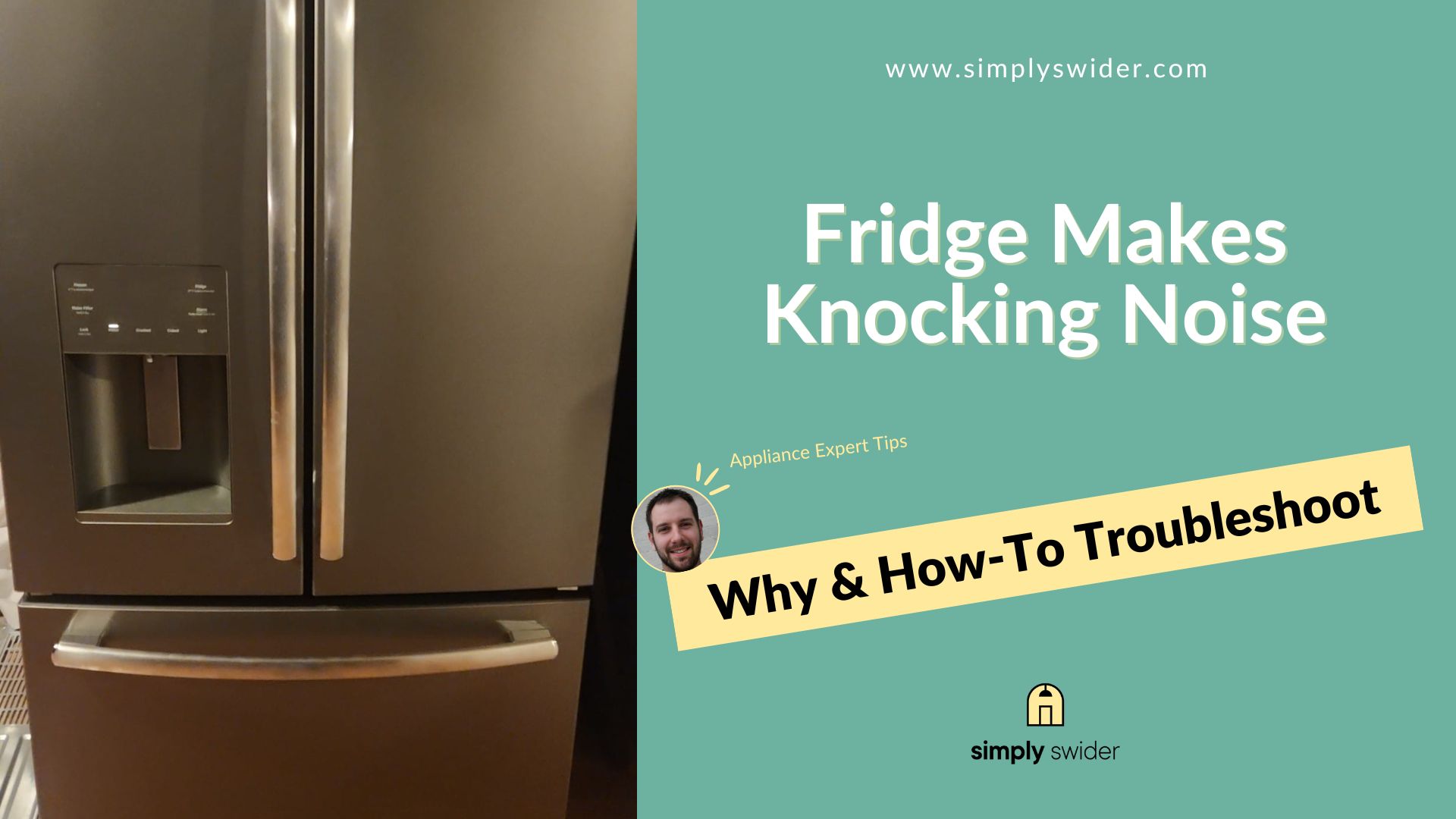
Jason, thank you for your excellent article.
I am a retired engineer and understand some technical aspects of refrigerators. However, I am stumped with trying to isolate the root cause of an intermittent banging/clunking refrigerator noise. I made many audio recordings of the noise and can view the audio waveform on my computer in order to try to isolate the problem.
Refrigerator is a Kenmore Model # 106.56822603, Manf date, 2006
Observations:-
– No cooling problems. Compressor seems to cycle normally and is a normal warm temperature, not extremely hot.
– Noise is comes in waves multiple times a day
– Mostly happens when the compressor is off, but I have recorded one instance when the compressor was running. – duration is around 3 – 7 seconds, starts lower volume, peaks and volume decays to zero
– Noise varies in intensity and sometimes a very loud metal-to-metal banging, sometimes a quite ticking, sometimes an overall vibration
– Noise has a regular frequency of around 230 beats per minute.- Seems to happen more after the refrigerator door is closed for longer periods of time.
– I opened the back of the unit but could not isolate a time when the noise happened. All coils and compressor fan were cleaned
– I replaced the starting relay and capacitor a few months ago when the compressor would not start. That problem was fixed.
– I just replaced that part again just a few days ago, just in case. Made no difference. Both parts were ordered from Amazon ( made in China)
Any additional help would be appreciated.
Thank You
– Gary
Hi Gary,
I’m wondering if a gear on your motor for the ice maker broke and it’s the ice maker trying to cycle. Is it making ice?
Jason.
My refrigerator constantly makes knocking noise but will stop when I turn the thermostat off. Any help would be appreciated.